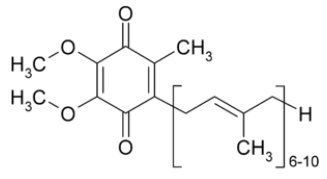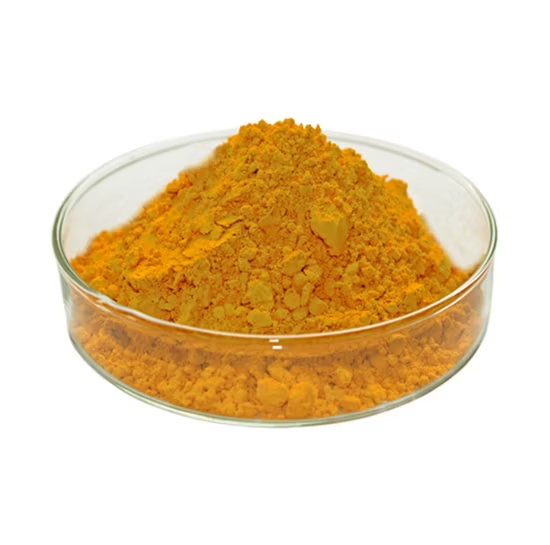
Coenzyme Q10 is a fat-soluble vitamin that is widely present in all organisms, including humans and other mammals. It plays an important role in cellular energy metabolism and antioxidant defense system. It is an important component of the mitochondrial electron transport chain and participates in the generation of ATP (adenosine triphosphate), thereby providing energy for cells.
With the improvement of health awareness, CoQ10 has become a star ingredient in the global nutritional supplement and functional raw material market. This article will provide systematic reference for global buyers from the aspects of the efficacy, industry application, global market trends and bulk purchasing guide of Coenzyme Q10.
Coenzyme Q10 Introduction
Coenzyme Q10, also known as ubiquinone, is a naturally occurring biochemical cofactor (coenzyme) and an antioxidant produced by the human body. The molecular structure consists of a benzoquinone ring and a long isoprene side chain. Its chemical formula is C59H90O4 and its CAS number is 303-98-0.

At present, Coenzyme Q10 is mainly obtained through the following two methods:
Natural Sources: CoQ10 is found in animal and plant cells, particularly in the heart, liver, and kidneys. It is also present in foods like fish, meat, broccoli, and cold-pressed vegetable oils (e.g., olive oil, wheat germ oil).
Synthetic Production: CoQ10 can be produced via chemical synthesis, starting with tyrosine, but this method is costly and may produce by-products. Alternatively, microbial fermentation using strains like Escherichia coli or Bacillus subtilis is a more efficient and commonly used method.
Benefits of Coenzyme Q10
Role in Cellular Energy Metabolism
Coenzyme Q10 is a vital component of the mitochondrial electron transport chain, participating in ATP production and serving as a core substance in cellular energy metabolism.
Studies indicate that CoQ10 maintains mitochondrial function and enhances energy production efficiency, thereby supporting normal cellular operations.
Antioxidant and Anti-Aging Effects
As a potent antioxidant, CoQ10 scavenges free radicals, reduces oxidative stress-induced cellular damage, and slows the aging process.
Research shows that CoQ10 levels decline with age, and supplementation can mitigate skin aging signs, such as reducing wrinkles, improving skin elasticity, and increasing hyaluronic acid concentrations in the skin.
Clinical Applications in Cardiovascular Health
CoQ10 holds significant clinical value in cardiovascular health. By enhancing energy metabolism in cardiac muscle cells, it improves the efficiency of heart contraction and relaxation.
Consequently, it is widely used in treating heart failure, hypertension, and other cardiovascular diseases.
Support for Immune System and Skin Health
CoQ10 also promotes overall health by boosting immune system function. It enhances the activity of immune cells and improves leukocyte function, aiding the body in resisting pathogens such as bacteria and viruses.
Additionally, by regulating intracellular energy metabolism, CoQ10 accelerates the recovery and responsiveness of immune cells, making it particularly beneficial for immunocompromised individuals.
In skin health, CoQ10 not only enhances antioxidant capacity but also stimulates skin cell regeneration and repairs the damaged skin barrier. It increases skin hydration, reduces UV-induced damage, and strengthens the skin’s natural defense mechanisms.
As a result, CoQ10 is frequently incorporated into skincare products as a key ingredient for anti-aging, wrinkle reduction, and skin nourishment.
Industry Application of Coenzyme Q10

Supplement Industry
CoQ10 is widely used in the dietary supplement industry, particularly in softgels, tablets, and powder forms, making it a popular choice for daily nutritional supplementation. Its primary benefits include boosting energy, providing antioxidant protection, and enhancing immune function. As a result, CoQ10 is extensively applied in cardiovascular health, anti-aging, physical stamina enhancement, and immune system improvement.
In addition, supplement manufacturers often formulate CoQ10 as a core ingredient combined with other nutrients to create diverse product formats, such as softgels, chewable tablets, effervescent tablets, and powders, catering to consumers’ personalized needs.
Cosmetics Industry
In the cosmetics industry, CoQ10 has emerged as a key ingredient in skincare products due to its potent antioxidant properties and anti-aging effects. It protects the skin from free radical damage, slows aging, and improves skin elasticity and firmness.
Additionally, CoQ10 promotes skin cell regeneration and repair, helping to reverse damage caused by UV exposure, pollution, and oxidative stress.
Pharmaceutical Field
In the pharmaceutical sector, CoQ10 serves as both a drug intermediate and a critical component in clinical therapies. It is utilized to treat various conditions, particularly cardiovascular diseases, metabolic disorders, and age-related degenerative conditions. Its primary mechanisms involve enhancing cellular energy production and improving disease-related symptoms.
Clinical Trials: CoQ10 has shown promising results in clinical trials for heart failure, exercise-induced fatigue, and Alzheimer’s disease. In cardiovascular patients, CoQ10 supplementation improves cardiac energy metabolism and strengthens myocardial function.
Drug Combinations: Owing to its antioxidant and energy-boosting properties, CoQ10 is often combined with other medications to enhance therapeutic efficacy and reduce side effects. For example, it is paired with lipid-lowering drugs to mitigate liver strain caused by these medications.
Food Industry
Coenzyme Q10 is gaining attention as a nutritional enhancer in the food industry. It is added to a variety of functional foods and beverages to help provide additional antioxidant protection, enhance immunity, and increase energy levels.
Global Market Demand & Supply Chain

At present, North America, Europe and Japan are the main consumer markets for Coenzyme Q10. According to multiple industry reports, the global Coenzyme Q10 market is growing at an annual rate of 6% to 8% and is expected to exceed US$1.5 billion in the next five years. So, what is driving the rapid development of this market?
As the global population aging trend intensifies, people’s attention to cardiovascular health continues to increase, which has led to a growing demand for Coenzyme Q10, a nutrient that has both antioxidant and energy metabolism support functions.
Secondly, the overall improvement of consumer health awareness and a large number of clinical studies have continuously confirmed the positive role of Coenzyme Q10 in antioxidant, heart protection and skin repair, further enhancing its market visibility and making CoQ10, which has antioxidant, anti-aging and heart protection effects, popular.
In addition, the rise of the sports nutrition market has also opened up new growth channels for Coenzyme Q10. As an important ingredient in supporting energy metabolism, its application in functional beverages and sports supplements has shown a clear growth trend.
China’s Advantage in CoQ10 Production
China dominates the global CoQ10 production, accounting for more than 90% of the world’s total production capacity. Its competitive advantages include:
Cost-effectiveness: China’s large-scale production capacity and mature supply chain make its production costs significantly lower than those in Europe and the United States. The widespread use of biofermentation methods (which are more accepted than chemical synthesis methods) ensures high yields, high efficiency and cost control.
Technological progress and quality improvement: Many Chinese manufacturers have obtained international certifications such as GMP, ISO, Kosher, Halal and FSSC 22000 to ensure compliance with global standards. Innovative technologies such as microencapsulation and nanotechnology improve product stability and bioavailability, helping to enter the high-end market.
Policy and infrastructure support: China’s provincial governments actively support the biopharmaceutical and nutraceutical industries through tax incentives, export tax rebates and simplified export procedures to enhance their international competitiveness.
Extensive global customer base: Chinese CoQ10 producers operate in an OEM/ODM model and establish long-term partnerships with global brands to provide them with raw materials or intermediates. This experience ensures strong client relationships and deep market expertise.
Buying Guide for Bulk CoQ10

Typical Specifications
In the raw material market, CoQ10 has a variety of specifications to choose from, and different application scenarios correspond to different forms and purities:
- 10% pure powder: suitable for application scenarios that require lower concentrations of CoQ10.
- 98% pure powder: high-purity CoQ10, suitable for applications with higher purity requirements, such as medicine and high-end health products.
- Water-soluble CoQ10: made through a special process to improve its solubility in water, suitable for products that require water solubility, such as beverages and oral liquids.
Purchasing advice: clarify the final product form and purpose, and choose the appropriate specifications. For beverages and fast-absorbing products, water-soluble specifications are recommended; for capsules and health tablets, 10% or 98% specifications are more common.
Quality Control Standards
High-quality Coenzyme Q10 raw material suppliers must comply with the following international quality system certification and testing specifications:
- GMP (Good Manufacturing Practice): Ensuring the safety and consistency of the production process is the minimum requirement for Coenzyme Q10 production.
- ISO 9000 series standards: Emphasizing the establishment and maintenance of the quality management system, applicable to the comprehensive quality management of Coenzyme Q10.
- HACCP (Hazard Analysis and Critical Control Points): Used to identify, evaluate and control risks that may affect product quality during the production process, and is the core of food safety.
- Third-party testing support (such as SGS, Eurofins)
- Provide ingredient analysis reports, heavy metal, pesticide residue, microbial limit test reports, etc.
Packaging Form and MOQ
Different suppliers provide a variety of packaging forms to meet logistics and warehousing needs:
- Standard packaging: 1kg aluminum foil bag lined with PE bag; 25kg cardboard barrel/plastic barrel with double seal.
- Sample specifications: 100g~500g small packages for sample or research and development.
- MOQ (minimum order quantity): generally 1kg~25kg depending on the process, some water-soluble specifications or customized products may have a higher minimum order quantity.
Storage and Transportation Conditions and Stability Issues
As a fat-soluble antioxidant, coenzyme Q10 is sensitive to light, heat and oxygen. Proper storage is the key to ensuring product quality:
- Keep sealed and store in a dry, cool, dark place.
- Recommended storage temperature 15-25℃, humidity <60%.
- Avoid storage with strong oxidants and volatile substances.
- Powdered products generally have a shelf life of 24 to 36 months.
- Water-soluble products are recommended to be stored at low temperatures and have a shorter shelf life (12 to 24 months).
- The use of antioxidants or anti-caking agents can extend the stability period, but attention should be paid to the safety of additives.
When purchasing coenzyme Q10 in bulk, it is recommended that the purchaser not only pay attention to the price, but also pay attention to the supplier’s quality system, process technology, third-party test reports and long-term supply capabilities. Reasonable specification selection, clear certification system and standardized logistics storage and transportation can ensure the stability and consistency of raw materials throughout the product life cycle.
Conclusion
As a leading Coenzyme Q10 supplier in the industry, SED Ingredients LTD always adheres to the service concept of “quality-oriented, customer-oriented”, and is committed to providing high-purity and cost-effective CoQ10 products to global customers. Whether you are a global nutrition brand, pharmaceutical company, or OEM/contract manufacturer, if you have any needs, please contact us.
